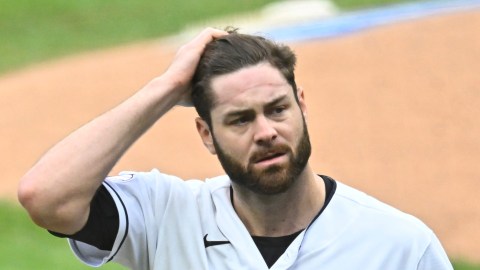You cannot necessarily call the responses excuses, for the Red Sox are merely answering questions from reporters when they say things like: “Interleague is an advantage to the National teams. We build our team around the designated hitter. … For us, we’re at a disadvantage. A lot.”
Those were the words of Kevin Youkilis on Saturday night. Others echoed his sentiments after the team’s second straight loss in Pittsburgh, and it is not hard to argue that the loss of the designated hitter means more to American League teams than the institution of it does for NL teams when they go over to the other side.
Some might call those words from Youkilis and his teammates an old-fashioned case of sour grapes. It’s been this way for years, since interleague play began in 1997 and for several World Series before that.
Where Boston has a legitimate gripe this time around is with the schedule makers. Rather than the customary three- or six-game NL excursion, the Red Sox were slammed with nine games in 10 days. It’s one thing to step out of your comfort zone for a weekend or so. It’s another to face those challenges for well over a week.
It is that scenario, as much as anything, that has caused manager Terry Francona a great deal of anxiety in recent days.
Francona has admitted to such emotion surrounding the Adrian Gonzalez-David Ortiz dilemma for one reason — the length of the trip.
“If we don’t play David for 11 [actually 10] days, that’s going to kill him,” Francona said prior to the trip. “I don’t want to do that.”
If Ortiz had three games off, Francona could stomach it. He’d still get batting practice and probably two to three plate appearances off the bench. Six games are a bit more difficult to endure, but Francona could manage by giving Gonzalez one day off and probably not missing much of a beat with either guy. Simply put, nine is too much.
The sheer fact that Francona has had to toy with the idea of Gonzalez playing right field, a frightening proposition if it led to an injury to Boston’s best hitter, is a testament to how monstrous an undertaking nine straight games in NL parks is. Francona likely wouldn’t give it a passing thought if the time period were brief. He knows that Ortiz could handle the dry spell.
Because Gonzalez and Ortiz are both so productive simply magnifies the point on the Boston side of things. Even if they weren’t, it still represents a prolonged period in which pitchers who are not used to hitting are being forced to take their hacks, and one guy around whom you build your lineup gets limited at-bats.
The schedule should allow teams to do so in fits and starts, perhaps in three separate three-game series, or one six-game trip to NL parks and three more at a later date.
This is just the second time Boston has had to endure nine straight games in National League parks. The first was in 2002. That was the year before Ortiz arrived, and it was a season that saw then-manager Grady Little utilize 11 different players at DH, led by Brian Daubach and Carlos Baerga.
Despite not having a regular at the position, the Sox still felt the sting of losing the DH during that nine-game stretch. They went 3-6 and averaged just over three runs a game. This from an offense that ranked second in the American League in runs scored that year.
Only Cleveland is in the same boat as Boston this season. They managed just four runs in getting swept in San Francisco to begin their nine-game excursion, surely displeased with having Travis Hafner, their .338-hitting DH, all but removed from the roster for nine games.
Interleague play in itself has issues. Those issues should not be exacerbated by these overwhelming stretches in which American League teams are forced to play pretend. They can do so for a few games here and there, but nine straight is too much.



